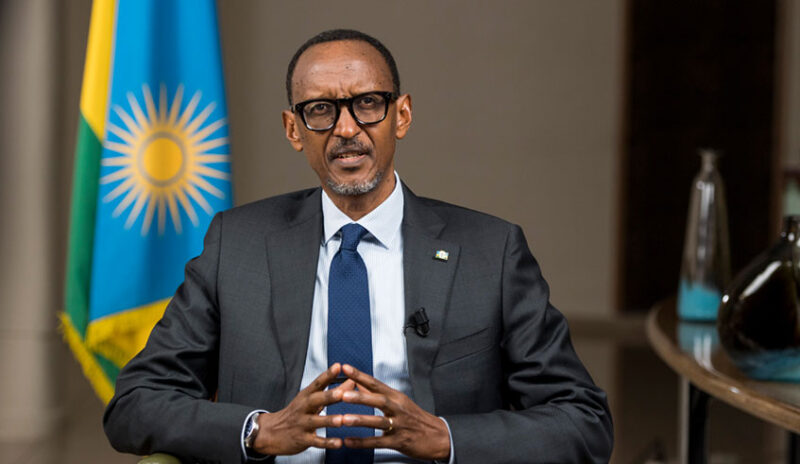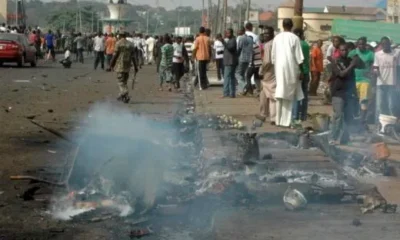Africa
Rwanda shuts 4,000 churches over noise pollution, others

Rwanda shuts 4,000 churches over noise pollution, others
No fewer than 4,000 churches have been closed down over the last month in Rwanda for failing to comply with health and safety regulations, including not being properly soundproofed.
It has primarily affected small Pentecostal churches and a few mosques, some of which operate from caves or on riverbanks.
“This is not being done to prevent people from praying but to ensure the safety and tranquilly of worshippers,” Minister of Local Government Jean Claude Musabyimana told state media.
It is the first serious crackdown since a law was enacted five years ago to limit the expansion of places of worship.
It requires them to function in an organised and safe setting, as well as prohibits the use of loud public address systems.
The Act also requires all preachers to complete theological instruction before starting a church.
When the law was passed in 2018, over 700 churches were immediately closed.
READ ALSO:
- Police hunt man who escaped to Nigeria after rape sentence in UK
- NLC to Police : Go after bandits, not peaceful protesters
- BREAKING: Protesters, security operatives clash in Kano, many killed
Rwandan President Paul Kagame stated at the time that the country did not require as many houses of worship, claiming that such a large number was only appropriate for more developed economies with the resources to sustain them.
Kagame, who recently won a fourth term in office with 99% of the vote, governs a closely controlled society in which his critics claim there is limited freedom of expression.
Local urban authorities are collaborating with the Rwanda Governance Board (RGB) to conduct an ongoing operation targeting churches.
The authorities claim they’re taking a firm stance because churches have had five years to completely comply with the requirements.
“The government has taken a stance against proliferation in the houses of worship. We still see cases of dilapidated [structures] and unhygienic conditions,” RGB chief Usta Kayitesi told reporters.
Mr. Musabyimana claimed that some of the churches that had been closed were operating in tents, exposing attendees to danger.
So far, 4,223 houses of worship have been closed, 427 of which are in caves, according to the privately owned Kinyarwanda language Igihe news website.
The vast majority of Rwandans are Christians; however, many still practice traditional beliefs.
Pentecostal churches, generally led by charismatic preachers who claim to be able to perform miracles, have expanded fast in many parts of Africa in recent years.
Some are large, attracting thousands of worshippers each Sunday, while others are little structures constructed without planning approval.
Rwanda shuts 4,000 churches over noise pollution, others
Africa
Nigeria withdraws fighter jets as Benin recovers after failed coup attempt

Nigeria withdraws fighter jets as Benin recovers after failed coup attempt
Nigeria has withdrawn the fighter aircraft it deployed in the Benin Republic following Sunday’s attempted coup, after security assessments confirmed that the situation in the neighbouring country has stabilised. Security sources said the aircraft—initially dispatched from Lagos for surveillance and regional monitoring—were recalled on Sunday afternoon when updated intelligence indicated that the crisis no longer posed “immediate threat to Nigeria’s territorial security.”
The failed coup, aimed at toppling the democratic government of President Patrice Talon, began with an early morning assault on the presidential residence in Cotonou.
Mutinous soldiers, dressed in full military uniform, attempted to seize power but were repelled by loyal forces. Unable to capture the President, the rebels proceeded to take over the Office de Radiodiffusion et Télévision du Bénin (ORTB), briefly controlling the national broadcast signal.
The crisis escalated rapidly, but the Beninese National Guard responded decisively, surrounding the television station and blocking the mutineers’ escape routes.
By late Sunday, loyalist security units had secured all major government installations, restoring order across the capital city.
READ ALSO:
- Dozen Soldiers Held as Benin Govt Thwarts Coup Against President Patrice Talon
- Benin govt says coup attempt foiled as soldiers seize state TV, gunfire rocks Cotonou
- BREAKING: Soldiers Announce Coup in Benin Republic, Declare President Patrice Talon Removed
“The situation is under control. The National Guard has everything surrounded,” a senior security official said, noting that negotiations were initiated to persuade the barricaded mutineers to surrender peacefully.
President Talon, reported safe in an undisclosed location, has yet to address the nation. Meanwhile, the streets of Cotonou remained tense but calm, with no reports of widespread violence or civilian casualties.
Presidential spokesman Bayo Onanuga confirmed in a statement on X that the coup had collapsed.
“Mutineers in military uniform who attempted to overthrow President Patrice Talon’s democratic government have failed. They seized the National TV after failing to enter the presidential residence,” he wrote.
He added that Colonel Pascal Tigri, the alleged leader of the mutiny, was on the run, while several members of the group had been apprehended.
Benin’s Interior Minister Alassane Seidou also appeared on national television, confirming that the military uprising had been foiled. “Early on Sunday, 7 December 2025, a small group of soldiers launched a mutiny aimed at destabilising the state and its institutions. The armed forces remained loyal to the republic, and their response allowed them to foil the attempt,” he said.
The Beninese government has since urged citizens to resume their normal activities, assuring the public that the security situation remains firmly under control.
Nigeria withdraws fighter jets as Benin recovers after failed coup attempt
Africa
Dozen Soldiers Held as Benin Govt Thwarts Coup Against President Patrice Talon

Dozen Soldiers Held as Benin Govt Thwarts Coup Against President Patrice Talon
Authorities in Benin Republic have arrested about a dozen soldiers following Sunday’s attempted coup, with security and military sources confirming that several of the suspected masterminds are already in custody. According to reliable sources, at least 13 suspects have been detained, including one former service member.
The arrests came after a group of military officers stormed the national broadcaster on Sunday morning, declaring that President Patrice Talon had been removed and that all state institutions had been dissolved. The officers, who identified themselves as the Military Committee for Refoundation, claimed to have taken control of government operations.
However, the presidency swiftly debunked the announcement, assuring citizens that President Talon remained safe and that loyal forces had regained control of critical installations.
READ ALSO:
- Benin govt says coup attempt foiled as soldiers seize state TV, gunfire rocks Cotonou
- BREAKING: Soldiers Announce Coup in Benin Republic, Declare President Patrice Talon Removed
- Nigerian Army Suspends Retirements for Officers Amid Nationwide Security Emergency
“This is a small group of people who only control the television. The regular army is regaining control. The city and the country are completely secure,” the presidency said.
Government officials have described the uprising as the action of a fringe faction with no real command of state power. The Interior Ministry also confirmed that the coup attempt was foiled within hours, following coordinated military intervention across Cotonou.
The thwarted coup has drawn immediate reactions from regional bodies, with ECOWAS and the African Union condemning the attempted takeover and calling for strict adherence to constitutional order. The incident adds to rising concerns over political instability in West Africa, which has witnessed a wave of military takeovers in recent years, including in Niger, Burkina Faso, Mali and Guinea-Bissau.
Security analysts say the swift suppression of the rebellion demonstrates the resilience of Benin’s democratic institutions, even as the country remains on high alert for collaborators or remaining pockets of resistance.
Dozen Soldiers Held as Benin Govt Thwarts Coup Against President Patrice Talon
Africa
Benin govt says coup attempt foiled as soldiers seize state TV, gunfire rocks Cotonou

Benin govt says coup attempt foiled as soldiers seize state TV, gunfire rocks Cotonou
The Government of Benin announced on Sunday that its armed forces had foiled a coup attempt, hours after a group of soldiers appeared on state television claiming to have overthrown President Patrice Talon.
The attempted coup marks the latest challenge to democratic stability in West Africa, a region that has witnessed a wave of military takeovers in Niger, Burkina Faso, Mali, Guinea, and most recently Guinea-Bissau.
Earlier on Sunday, at least eight soldiers, some wearing helmets, appeared on national TV, declaring that a military committee led by Colonel Tigri Pascal had taken power, dissolved national institutions, suspended the constitution, and closed all borders.
“The army solemnly commits to give the Beninese people the hope of a truly new era,” one soldier said on air.
READ ALSO:
- BREAKING: Soldiers Announce Coup in Benin Republic, Declare President Patrice Talon Removed
- Nigerian Army Suspends Retirements for Officers Amid Nationwide Security Emergency
- Dangote urges wealthy Nigerians to invest in industries, not luxury cars, private jets
However, Interior Minister Alassane Seidou later stated that the coup attempt had been thwarted. “The government urges the population to go about their business as usual,” he said.
Foreign Minister Olushegun Adjadi Bakari confirmed to Reuters that “a small group” of soldiers attempted to overthrow the government but had managed only to seize the state broadcaster, while loyal forces worked to restore order.
Gunfire was reported across several Cotonou neighbourhoods early Sunday as residents headed to church. The French Embassy warned citizens to stay indoors after shots were heard near President Talon’s residence.
The coup attempt comes ahead of the April presidential election, which is expected to mark the end of Talon’s tenure after two terms in office. Though credited with reviving economic growth, Talon’s administration has faced rising jihadist attacks in northern Benin, including an April assault that killed 54 soldiers.
Tensions have also been heightened by a newly adopted constitution extending the presidential term from five to seven years — a move critics called a power grab. Meanwhile, opposition candidate nominations have faced disputes, with the Democrats party seeing its proposed candidate disqualified by a court.
Benin govt says coup attempt foiled as soldiers seize state TV, gunfire rocks Cotonou
-

 Sports2 days ago
Sports2 days ago2026 FIFA World Cup Draw: England Draw Croatia as Brazil Face Morocco in Tournament Opener
-

 News2 days ago
News2 days agoAkpabio sues Natasha for ₦200bn over sexual harassment allegations
-

 metro2 days ago
metro2 days agoTinubu Govt Eliminates More Terrorists Than Previous Administrations — Fani-Kayode
-

 metro1 day ago
metro1 day agoNigerian woman sparks outrage for refusing chemotherapy despite ₦30 million donations over religious Beliefs
-

 metro2 days ago
metro2 days agoFour Teenagers Killed in Banki Explosion as Borno Police Probe Deadly IED Blast
-

 Opinion3 days ago
Opinion3 days agoSiyan Oyeweso: Lessons in virtue and vanity
-

 Politics2 days ago
Politics2 days agoOsogbo Youth Group Condemns APC Over Disqualification of Adegoke SAN
-

 Entertainment2 days ago
Entertainment2 days agoDStv warns subscribers of possible loss of CNN, discovery, 10 other channels in 2026













